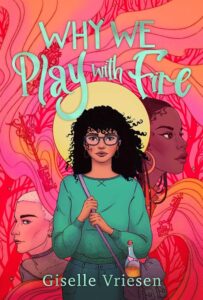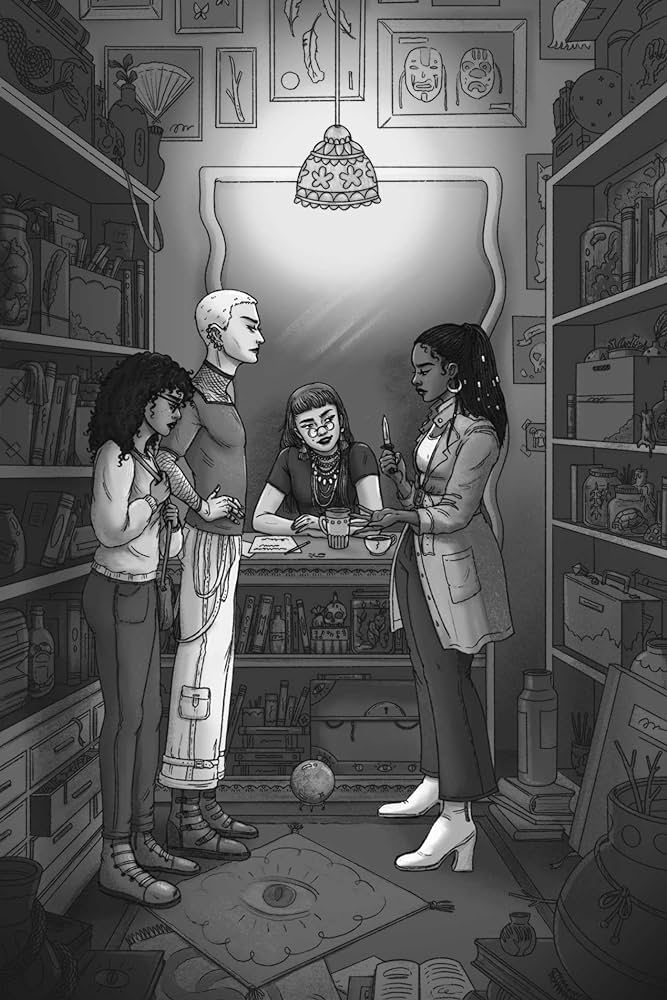The ‘spectacle of magical mischief’
Why We Play With Fire
by Giselle Vriesen
Toronto: 100 Block Futures, 2024
$23.99 CAD / 9781955905312
Reviewed by Zoe McKenna
*

Giselle Vriesen’s debut novel, Why We Play With Fire, takes readers into a world that brims with magic and mayhem at every turn.
Thea, Vriesen’s protagonist, is sweet, shy, and struggles to fit in with others in her school and community. Her life in the Gulf Islands is quiet, shared only with her mother and grandmother… until she stumbles upon a statue that awakens something within her. Instantly, Thea is surrounded by whispers she can’t parse. The last thing Thea expects of her sleepy Salt Spring Island life is to be thrown into a magical world that has long existed just beneath the surface of her reality.
Thea’s mother and grandmother know this mystical realm—and its threats—all too well. They know Thea is no longer safe on Salt Spring Island. Seconds before being pushed down a well that teleports Thea far away from her home and family, her grandmother gives her exactly one one instruction: “retrieve the keys.”
When Thea emerges on the other side of the portal, she finds herself at the door to the Malachite house. Inside, the house is populated with Godspring—those with direct heritage to the gods, a connection that provides them with magical powers. Thea soon learns that she, too, has celestial ancestry, and her powers will emerge through a series of three ‘awakenings’ that she can neither control nor anticipate.
Once again, Thea is out of place. Whereas everyone else in the Malachite house seems to understand their magical background and emerging powers, Thea has been shielded from this world her whole life. Her awkward shyness makes it difficult to form connections with the Malachites, so when the keys to a box containing “a power not seen on earth in thousands of years” go missing, suspicion is immediately cast her way.
Fuelled by her grandmother’s parting words and a need to prove herself, Thea embarks on a quest to locate the keys and return them to the Malachites, before their rivals, the Arcana, get to them first.

Between the Malachites, the Arcana, the gods, and other supporting figures, Vriesen has a cast of characters numbering in the dozens. Despite that population—and the fact that the three lead characters share almost the same name—each character is beautifully realized and consistently distinct. Rather than distracting from the core narrative, Vriesen’s characters weave seamlessly into the world-building and help unveil the lore that underpins the story. A multitude of genders, cultures, and backgrounds are represented across the Malachite house, contributing richness to the narrative and much-needed diversity to the genre.
As Thea moves between Salt Spring Island (as well as Crofton and Duncan on Vancouver Island), local readers can trace her footsteps up and down familiar streets. These settings are perfectly depicted and hyperrealistic, making it all the more impressive when Vriesen swiftly guides Thea into the magical underbelly. Soon, the Pacific Northwest is far behind, replaced by locations from across the globe and from outside of our known universe.
Just as Why We Play With Fire’s setting walks the line between two realms, Thea’s storyline manages to be simultaneously out-of-this-world and intently realistic. Each of Thea’s awakenings is a new coming of age—daunting, exciting, and overwhelming in equal parts.
Paired with Thea’s desperate need to fit in with her new friends and find her footing alone in the world, the story mirrors the uncomfortable and scary experience of the transition from teenager to adult. In this, Vriesen speaks clearly to her young adult audience: for better or worse, rewarding and difficult things can, and will, co-exist.

In these aspects, Why We Play With Fire is reminiscent of our most cherished magical stories. As Thea embarks on her adventure with the Malachites, Vriesen layers the traditional hero’s journey on top of her remarkably intricate world. The ups and downs of the narrative and the obstacles Thea faces along the way are familiar, but not predictable. The result is a narrative with a web of history, heritage, and lore that still offers the warm, fuzzy feeling of the stories we know and love.
It feels like a long time since I’ve read a fantasy novel that is so thoroughly dedicated to being joyous, buoyant, and fun. To be sure, there is a place in the genre for dark stories, complicated narratives, and heady theoretical pieces. Yet, there is something so refreshing, earnest, and hopeful about a debut that manages to both spotlight the nuanced political and cultural experiences of those often in the margins while still giving itself over to the spectacle of magical mischief. As Why We Play With Fire concludes, it still abounds with possibilities. Where Thea’s powers take her is yet to be seen in, what I can only hope to be, a quickly emerging sequel.
*

Zoe McKenna holds a MA from the UVic and a BA from VIU. Her thesis, as well as a great deal of her other reading and writing, focuses on horror writing in Canada, especially that by BIPOC authors. Her previous work has appeared in VIU’s Portal Magazine and Quill & Quire. When not reading, writing, or reviewing, Zoe can be found hiking a local mountain or in front of a movie with her two cats, Florence and Delilah. She is always covered in cat hair and wears almost exclusively dark clothing to prove it. Find her on Twitter. [Editor’s note: Zoe McKenna has reviewed books by Scott Alexander Howard, S.W. Mayse, Linda Cheng, Paul Cresey, Michelle Min Sterling, Eve Lazarus, David Wallace, David Ly & Daniel Zomparelli, Sophie Sullivan, kc dyer, Robyn Harding, and Lindsay Cameron for BCR.]
*
The British Columbia Review
Interim Editors, 2023-25: Trevor Marc Hughes (nonfiction), Brett Josef Grubisic (fiction)
Publisher: Richard Mackie
Formerly The Ormsby Review, The British Columbia Review is an online book review and journal service for BC writers and readers. The Advisory Board now consists of Jean Barman, Wade Davis, Robin Fisher, Barry Gough, Hugh Johnston, Kathy Mezei, Patricia Roy, Maria Tippett, and Graeme Wynn. Provincial Government Patron (since September 2018): Creative BC. Honorary Patron: Yosef Wosk. Scholarly Patron: SFU Graduate Liberal Studies. The British Columbia Review was founded in 2016 by Richard Mackie and Alan Twigg.
“Only connect.” – E.M. Forster
2 comments on “ The ‘spectacle of magical mischief’”